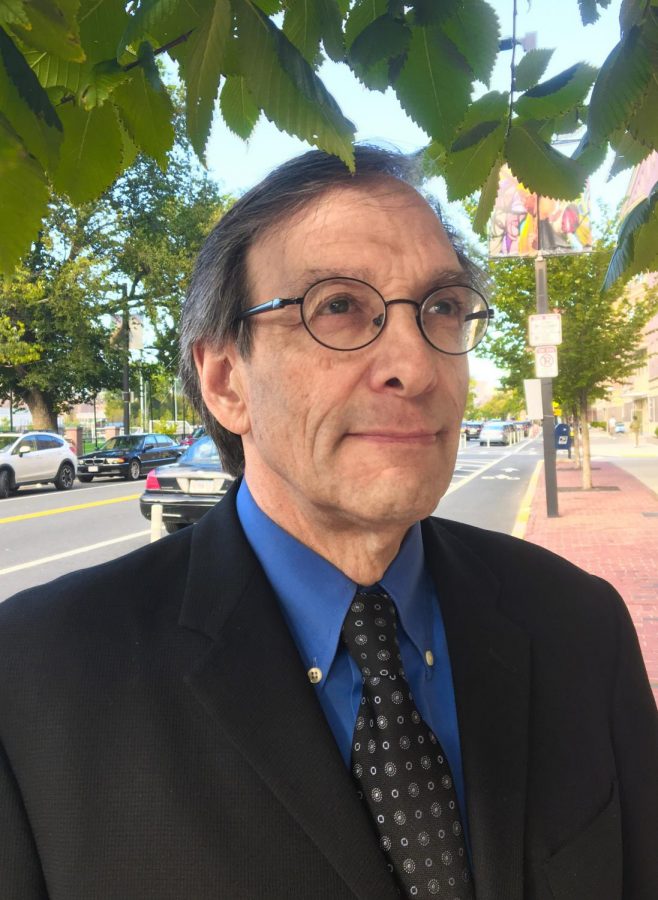Trump shares NU professor’s criminology research in ‘unwelcome endorsement’
James Alan Fox, an NU criminology professor, found himself plunged into controversy when Trump shared his research on Twitter.
September 18, 2019
Criminologist James Alan Fox never expected that he’d wake up one morning to thousands of tweets from outraged liberals and delighted Trump supporters.
On Aug. 15, President Donald J. Trump shared Fox News Channel host Laura Ingraham’s tweet, which included a link to Professor Fox’s interview with Reason’s Nick Gillespie. The tweet condensed a 46 minute podcast into 78 characters.
“There is no evidence that we are in the midst of an epidemic of mass shootings,” Fox said in the podcast, which prompted a storm of controversy on Twitter.
Fox, a professor of criminology, law and public policy at Northeastern, is also a leading scholar and one of the head researchers of U.S. mass shootings and serial murder. Fox is working on several projects, including a research study in which he empirically measures whether news reporting about mass shootings inspires a trend.
After Trump’s retweet, Fox said he received support from people he did not necessarily agree with and backlash from people who “think like him.” He said he did not welcome the endorsement by Trump, and that he is “certainly not a fan of his.”
The Gun Violence Archive reports that there have been over 2,000 mass shootings since the Sandy Hook Elementary School shooting in December 2012. Currently, in 2019, there have been 283 mass shootings, with an average of one mass shooting a day.
Fox said there is no long-term data to suggest the growth or spread of mass shootings, and people should “be wary of data sets that collect information retrospectively in situations where cases may be hard to find.” He said there has been a slight increase in mass shootings in the last two years, but whether that increase will continue is inconclusive.
Not everyone agrees with Fox’s interpretation of the data. In an article for GQ, Mari Uyehara wrote that mass shootings are not only an epidemic, but a uniquely American epidemic that is a result of the government. “No other developed country has anywhere near this level of both gun violence and mass shootings,” Uyehara wrote.
Despite the apparent increase in shootings, Fox said he believes it is not statistically significant enough to conclude an epidemic. “If there is an epidemic, it’s an epidemic of fear,” he said.
Inconsistencies in data and trends are only part of the problem. The other part, Fox said, is how Americans define mass shootings. In 2013, the Gun Violence Archive redefined mass shootings as situations in which four or more people were shot, as opposed to four or more people being killed. “Mass shootings” and “mass killings” are often conflated in datasets and media publications — and according to Fox, having a clear distinction between the two terms is crucial, or else researchers could neglect important pieces of data.
Fox said the portrayal of mass shootings in the media has generated an unnecessary surge of panic for a rare phenomenon. In a survey sponsored by the Washington Post that collected data from the first week of September, 60 percent of Americans fear there is going to be a mass shooting in their neighborhood. According to a USA Today survey from August, 21 percent of Americans avoid certain public places because they fear there could be a mass shooting.
“There is too much news reporting about pain and suffering,” Fox said.
He said he believes the style of news reporting can not only contribute to a false sense of panic, but also to the recurrence of mass shootings. It could inspire individuals, who would enjoy catalyzing disorder and torment, to act on their unhappiness. Fox said there needs to be more impactful images of community resilience and strength, such as the people of El Paso lining up to donate blood.
“That sends the message that the killer didn’t win, that we were stronger than he was,” Fox said.
When asked about red flag laws and predictive policing, Fox said it is impossible to identify mass shooters in advance. “There are lots of people who are scary, but that doesn’t mean they kill,” he said.
Fox said he supports better gun control because of the prevalence of gun violence, but does not think it will have an impact on mass shooters. He said he believes that mass shooters are determined individuals who will find a way to get a gun even if they can not legally purchase one, and that stricter gun control might actually antagonize mass shooters, who already believe they are unjustly targeted.
A common trait among mass shooters is their lack of support systems, Fox said. Without support systems, mass shooters do not have anyone for consolation or to help them rationalize when they are being unreasonable.
There are ways other than gun control to combat mass shooters, according to Fox.
“We can be better neighbors. We can be better co-workers. We can be better classmates. We can be better at helping other people who are suffering,” he said.







